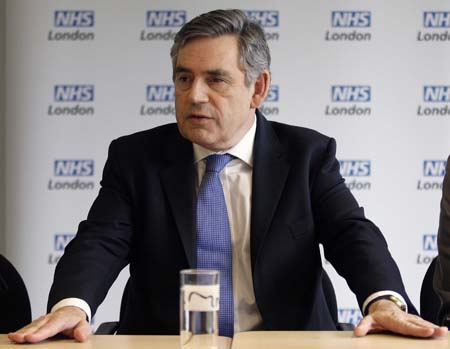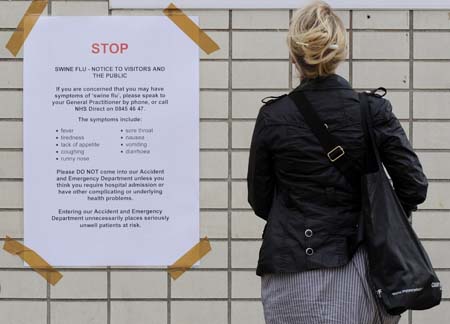People in Britain may wonder how many new cases of H1N1/A flu increased in this week, since the authority just announced there are 100,000 new cases in last week, which lead to different opinions in the public.
"The Government has stated that there have been 100,000 cases of swine flu. I'm not so sure," said Max Pemberton, a senior doctor. "Because of logistical considerations around testing everyone with suspect symptoms, most diagnoses are clinical, rather than laboratory-based. I suspect this leads to a high false-positive rate."
|

|
|
Britain's Prime Minister Gordon Brown speaks during a visit to a National Health Service (NHS) centre in central London, July 24, 2009. Europe's drug watchdog has begun reviewing data on pandemic flu vaccines with the goal of getting medicines to protect against the H1N1 virus approved before flu season starts in the Northern Hemisphere, likely in September. [Xinhua/Reuters] |
He thought that the "National Pandemic Flu Service," a website launched on July 23 to enable self-diagnosis, will make the sensation even worse.
The National Flu Pandemic website, which launched at 3 pm on Thursday, was receiving 2,600 hits per second - or 9.3 million hits per hour – at around 5 pm. The huge volume of traffic caused the site to temporarily crash but it was running smoothly again a short time later.
That phenomenon may illustrate the panic in the general population, which may be influenced by predictive numbers released by the authorities: 65,000 deaths in "the worst scenario," "100,000 new cases in a week" and even "cases could reach 100,000 a day by late August."
|

|
|
A woman reads a H1N1 flu virus warning sign outside a hospital in London, July 22, 2009. There are an estimated 55,000 new cases of swine flu in Britain a week, although in most cases the symptoms are mild. [Xinhua/Reuters] |
?"Nobody has a cold, or a stomach bug, or a headache any more: everyone has swine flu," says Pemberton.
The authorities has said "100,000" is based on "flu-like illness" and "a range of assumptions," which gives a range of 60,000 - 140,000, where 100,000 is the mostly probable. But it is always the final one number that catches eyeballs, not its technological background.
As for the "worst scenario" of 65,000 deaths, a comment on the Daily Telegraph said: "Yet it is a sound rule of thumb in public health matters that it is wiser to prepare for the worst, and that is what the Department of Health has done."
But also on the website of Daily Telegraph, many people expressed different opinions. One man named John Turner posted: "The government have allowed the media to sensationalize swine flu as it draws peoples' attention away from things like ministers' expenses and the economy amongst other things."
(Xinhua News Agency July 27, 2009)